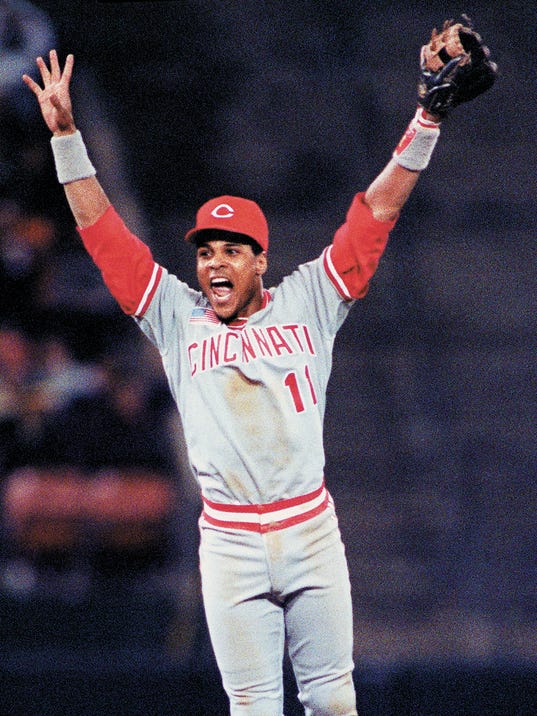Barry Larkin was a better baseball player than Derek Jeter.
Jeter will rank ahead of Larkin on this list, because being able to stay on the field matters, and Jeter was a lot better at that, but in terms of doing things well when on the field, Larkin was superior, and I don't think it's especially close. As hitters they're close, with Jeter batting .310/.377/.440 for his career, and Larkin batting .295/.371/.444. Adjusting for their respective ballparks and slightly different eras, Jeter had an OPS+ of 115 and a wRC+ of 119, while Larkin had an OPS+ of 116 and a wRC+ of 118. Both were good base runners, but Larkin has the edge, stealing more bases and with a higher success rate, plus doing things like taking the extra base a bit better. Once you look at defense, Larkin pulls well ahead. He was a good defender, while Jeter was a poor one. Larkin's sample size is far smaller, but he also has better postseason numbers than Jeter. It seems off to call someone who won an MVP and was voted into the Hall of Fame underrated, but I'm going to. Barry Larkin doesn't get nearly the attention he ought to.
Jeter will rank ahead of Larkin on this list, because being able to stay on the field matters, and Jeter was a lot better at that, but in terms of doing things well when on the field, Larkin was superior, and I don't think it's especially close. As hitters they're close, with Jeter batting .310/.377/.440 for his career, and Larkin batting .295/.371/.444. Adjusting for their respective ballparks and slightly different eras, Jeter had an OPS+ of 115 and a wRC+ of 119, while Larkin had an OPS+ of 116 and a wRC+ of 118. Both were good base runners, but Larkin has the edge, stealing more bases and with a higher success rate, plus doing things like taking the extra base a bit better. Once you look at defense, Larkin pulls well ahead. He was a good defender, while Jeter was a poor one. Larkin's sample size is far smaller, but he also has better postseason numbers than Jeter. It seems off to call someone who won an MVP and was voted into the Hall of Fame underrated, but I'm going to. Barry Larkin doesn't get nearly the attention he ought to.
* * *
This countdown is a way for me to look back at the three decades I've spent as a baseball fan. My introduction to the project, with an explanation of sorts, and links to every entry can be found here.
* * *
When you're a child you often don't know enough about the world to have a clear understanding of things, and so it was that when I was young, I was pretty sure Barry Larkin was my cousin. My mother is a Larkin, and she comes from a big family. Naturally, I figured it was big enough to include Cincinnati's All-Star shortstop. (Oddly enough, I don't recall ever thinking Gene Larkin was any relation to me.) I'm not sure when I realized that Barry wasn't my kin, I suppose it just blurred together with all the other minor disappointments that come from growing up and discovering life is neither as simple nor as complicated as you want to believe.
Larkin's MLB career began the same season as my baseball fandom, when he made his debut in August of 1986, little more than a year after being drafted. He only had time to play in 41 games that season, but still received mention on one Rookie of the Year ballot. It was two years later that he had his breakout season, making the first of a dozen All-Star appearances. Another two years later, he was the best player on a World Series winner, batting .353 in the Fall Classic as the Reds swept the A's.
In 1995 Larkin led the Reds to a division title (They beat the Dodgers in the NLDS, then lost each of the first two games of the NLCS to Atlanta in extra innings, and could not recover. Larkin never made the postseason again.), and won the National League MVP Award. He was even better the following season, hitting a career high 33 home runs and also stealing 36 bases, making him the first shortstop in Major League history to join the 30/30 club.
During the 13 years from 1988 to 2000, Larkin was an All-Star and/or Silver Slugger winner every season, and only Barry Bonds, Roger Clemens, Greg Maddux, and Ken Griffey had more WAR than Larkin during that time. Making that somewhat more impressive Larkin ranks that high despite having missed ~20% of his team's games during that stretch, due to a string of injuries. Among the nineteen seasons in Larkin's career, he appeared in 130+ games in just eight of them. He appeared in 150+ games just four times.
If Larkin had Jeter's ability to stay healthy, and had played in 150+ games thirteen times, and 130+ games seventeen times, he'd have a strong case for having been one of the five best shortstops in baseball history. As it is, he drops back a bit, because as I already said, being able to stay on the field matters. Larkin is still one of the greatest players I've ever gotten to see play, and if I squint, he still seems like family.

No comments:
Post a Comment
Note: Only a member of this blog may post a comment.